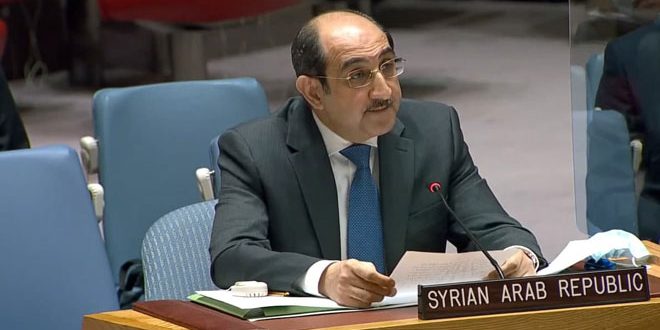Sabbagh: Politicization of the work of OPCW has turned it into a tool in the hands of certain countries
Syria’s permanent representative to the United Nations, Bassam Sabbagh, stressed the necessity of correcting the course of the Organization for the Prohibition of Chemical Weapons (OPCW) and returning to its normal role as a fundamental and neutral axis in the non-proliferation system.
He noted that the politicization of its work has made it lose a large part of its credibility and turned it into a tool in the hands of certain countries instead of being a faithful watchdog for the implementation of the ban agreement.
During today’s Security Council session, Sabbagh expressed Syria’s regret that the council’s discussions became a platform for some Western member states to make misleading accusations against it, ignoring the fact that Syria voluntarily joined the Chemical Weapons Convention in 2013 and worked with credibility and transparency to implement its obligations and to destroy its entire stockpile of chemical weapons and their production facilities.
Sabbagh pointed out that these countries continue to ignore the existing cooperation during the past years between Syria and the Organization for the Prohibition of Chemical Weapons, and the close consultations with the Technical Secretariat, which have achieved significant progress that clearly expresses Syria’s fulfillment of its obligations under the Convention.
Sabbagh asserted that Syria confirmed in its 92nd monthly report that it has been keen since its accession to the organization to cooperate with the technical secretariat, but despite this cooperation over the past eight years, the secretariat met it with constant denial.
He added in this regard that the Minister of Foreign Affairs and Expatriates welcomed the invitation addressed to him on the 24th of last June, from the Director-General of the organization, Fernando Arias, to conduct high-level communication and his readiness to meet with him in Damascus with the aim of exchanging views and discussing the developments that took place during the past period regarding mechanisms and working methods and agreeing on the steps to be taken in the future within the framework of Syria’s implementation of its obligations under the agreement.
Sabbagh stressed Syria’s absolute rejection of all skeptical campaigns launched by some well-known countries about their cooperation with the organization.
Sabbagh denounced the allegations mentioned in the statements of some countries about Syria’s refusal to grant the assessment team entry visas, noting that the team has so far conducted 24 rounds of consultations in Syria, during which no problem arose regarding obtaining the necessary entry visas. No agreement has been reached so far between the two sides on a date for the assessment team’s visit. It is unfortunate that the Director-General last June postponed sending the team to Syria under the pretext of high summer temperatures.
Sabbagh confirmed that there is a real challenge in confronting chemical terrorism. But what raises suspicion is that this challenge does not get any attention from some Western countries and does not raise their concern despite the terrorist groups’ increasing attempts to use weapons and toxic chemicals in Syria, and frequent information about the preparation of these groups to fabricate stages using chemical weapons to accuse the Syrian Army.
Sabbagh indicated that terrorist groups continue their attacks on safe civilians and the Syrian Army’s positions in the countrysides of Homs, Hama, Lattakia and Idlib from time to time, which makes the security situation in these areas relatively unstable.
Sabbagh pointed out that the facts are still unfolding day after day regarding what was mentioned in the OPCW report on the alleged Douma incident, which clearly indicates the distortion of the facts by senior officials of the organization in line with the story of the United States, France and Britain to find a pretext for the tripartite aggression that committed by those countries on Syrian territory.
Sabbagh stressed that the politicization that the OPCW is suffering from has kept it far away from the technical nature of its work and made it lose a large part of its credibility.
“ The organization has turned into a tool in the hands of some countries to target a country party to the Convention instead of being a faithful watchdog for the implementation of the Chemical Weapons Convention. All this requires correcting the organization’s course and returning to its natural role as a basic and neutral pillar of the chemical weapons non-proliferation system,” he concluded.
Inas Abdulkareem

